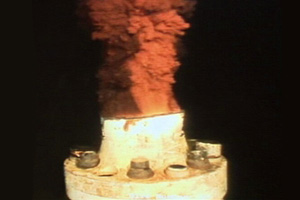The White House is pushing back against the draft reports the National Oil Spill Commission released Wednesday on the Deepwater Horizon oil spill that included scathing criticism of the administration’s handling of the disaster. The reports’ harshest criticism was directed toward the administration’s handling of information about the size of the spill and the extent of the damage.
“This was an unprecedented environmental disaster met with an unprecedented federal response which prevented any of the worst-case scenarios from coming to fruition,” White House Press Secretary Robert Gibbs told reporters Thursday. “When we had information, we gave it to the public.”
He also refuted the report’s claim that the Office of Management and Budget blocked another federal agency from releasing estimates about the worst-case scenario for the spill. “No information was altered. No information was withheld. And nothing in the report had anything to do with the robust response,” said Gibbs.
Gibbs defended the report’s criticism of White House Energy and Climate Adviser Carol Browner for misrepresenting a document outlining where the oil in the Gulf went. “I think it is fair to say that Carol probably did hundreds of hours of interviews and may have misspoke once, which is a pretty darn good track record and one that we made sure was accurate certainly just a few hours later,” said Gibbs. In fact, the report lists multiple media appearances in which Browner made the similar claims about the oil being “gone.”
Gibbs also maintained that the White House believed the report “represented the fact that there was very good news, that oil had biodegraded, that oil had been skimmed, that oil had been burned, that the very worst-case scenarios that many people thought we would be dealing with never came to fruition, largely because of that federal response.” The spill commission’s report actually notes that the so-called oil budget didn’t actually look at the amount of oil that had biodegraded, and criticized this as one of the “important shortcomings” in the report that the administration “obscured” its public roll out.
Gibbs did acknowledge that the response could have been improved, however. “There isn’t anybody in this building or anybody who worked on this that would say we did everything perfectly,” said Gibbs.













